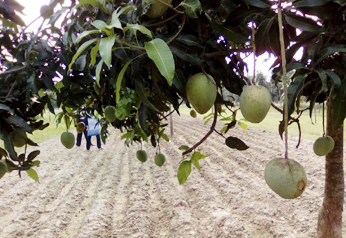RAJSHAHI, June 10, 2018 (BSS) – Mango intercropping with various cereal
crops especially paddy has started contributing a lot towards boosting mango
yield in the region.
The intercropping has been gaining momentum in the region including its
vast Barind tract as the growers in general are getting interested towards
the farming.
In the wake of adverse impact of climate change, the farmers face
trouble to depend on only paddy cultivation for the last couple of years.
To get more income and to recoup the losses, they are cultivating paddy,
onion, garlic, brinjal, mustard, turmeric and papaya with mango as
intercropping. The farmers also created new mango orchards in the new method.
“I have an eight-bigha of mango orchard of intercropping with various
seasonal crops. I am getting additional income from the farming,” said Jamal
Hossain, a farmer of Charghat Upazila in the district.
According to the Department of Agriculture Extension, the beneficiary
farmers cultivated mango in around 25,000 hectares of land in Rajshahi,
Chapainawabganj, Naogaon and Natore disricts.
Dr Sharaf Uddin, Senior scientific officer of Regional Horticulture
Research Station said intercropping with sugarcane had been found as more
beneficial to the growers as it could boost total crop production per unit
area coupled with ensuring sustainable mango cultivation with higher economic
benefit compared to other crops.
Quoting the field-level research findings and farmers’ views, the mango
researcher said systematic intercropping of paddy, onion, lentil, mug bean,
garlic and some other winter crops, vegetables and spice help increase mango
yield compared to sole-cropping.
Dr Sharaf Uddin said intercropping not only increase total crop
production but also help improve soil health and fertility with little or no
negative effect on mango yield and quality.
Furthermore, intercropping create additional job opportunity needed for
intensive crop production. He underscored the need for expansion of mango
intercropping through reactivating the field level agricultural officials and
staff for the nation’s food security.
The production of the juicy fruits increases each year for its profit,
but unfortunately, not a single mango-processing plant has been established
in the region for the preservation of the fruits since the inception of the
country.
Mangoes grow almost everywhere in the district but Poba, Charghat and
Bagha have a long-lasting tradition of producing quality fruits.
As the growers reap large sums of money from mango farming, it
encourages many others towards farming mangoes, in turn resulting in an
escalation of acreage.



